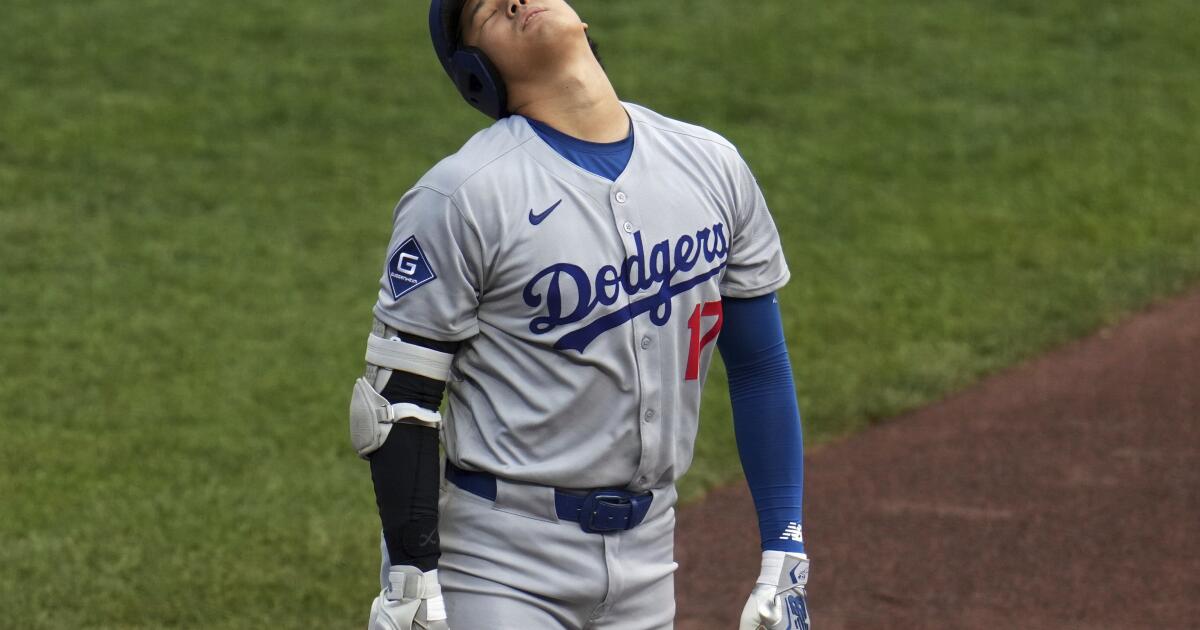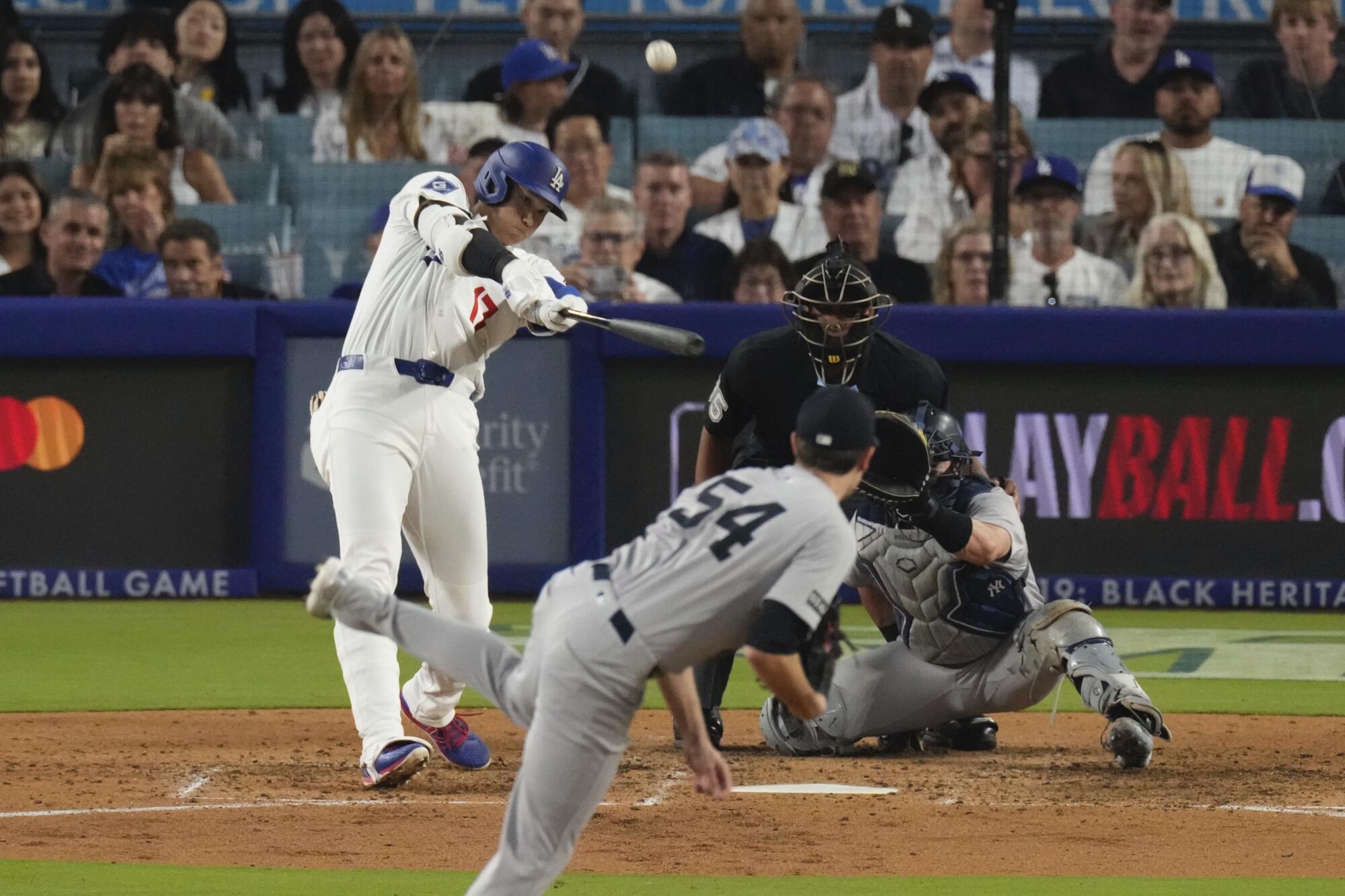Slumping Dodgers lose again to the lowly Pirates
PITTSBURGH — It was a pivotal moment, in a pivotal game, in what’s become a pivotal week for the Dodgers in the National League West standings.
Which, rather predictably given their recently floundering form, meant they found a new way to mess it all up.
In the top of the second inning on Wednesday night at PNC Park, the Dodgers appeared to be in optimal position.
Earlier in the day, the second-place San Diego Padres had been swept by the woebegone Baltimore Orioles, opening the door for the Dodgers to extend their 2½-game lead in the division. And despite trailing by a run in their own showdown against a last-place team, the Dodgers had the Pittsburgh Pirates on the ropes, loading the bases with no outs for a chance to take the lead.
The task, at that point, was simple.
Get the ball in play. Manufacture some early scoring. And, at the very least, set a positive tone for a night in which the NL West lead could grow.
“That’s a situation where you get shorter with your swing, use the big part of the field and you’ve got to drive in a run,” manager Dave Roberts said.
That approach, however, never materialized.
Over the rest of an inexplicable 3-0 loss to the Pirates, what happened next would instead loom large.
First, second-year outfielder Andy Pages came up, worked another full count against Pittsburgh starter Braxton Ashcraft … then went down swinging chasing a slider that would’ve been ball four.
Next, rookie infielder Alex Freeland again ran the count full, got an elevated slider up in the zone to hit … but kept the bat on his shoulder as the umpire rung him up for a called third strike.
A Kiké Hernández flyout would ultimately end the inning. But it was the first two at-bats that had Roberts fuming afterward.
“You never want to say that one inning kind of win or loses a game,” Roberts said. “But the second inning, bases loaded, nobody out — I just felt that we had two bad at-bats and didn’t come away with anything.”
“That flipped the game,” Roberts later added. “It flipped the momentum.”
Indeed, on a night the Dodgers (78-61) failed to score any of their 11 baserunners or record a hit in seven at-bats with men in scoring position, no sequence was more frustrating than their second-inning fizzle.
It was the latest epitome of the team failing to produce in a clutch situation. Another example of their roster flunking some basic fundamentals.
“We’ve got to collectively get all of us on board understanding the magnitude of each at-bat, each situation,” Roberts bemoaned from his office postgame. “I sound repetitive [about how] it’s got to get better. But I do believe that having the right approach, the right mindset, the right urgency in a particular at-bat lends itself to better results.”
This has been a recurring theme for the Dodgers during the second half of the season; the kind of fine-margin miscues that have haunted them during a perplexing 22-29 stretch since July 4.
Sometimes, it’s their big-name superstars that falter. In other cases, it’s younger contributors like Pages and Freeland who fail to execute when required.
The only constant: Every time the Dodgers seem to be turning a corner, they find another way to trip themselves up.
“I do believe that the guys that we have in the room are capable of putting together consistent team at-bats of urgency from the first pitch on,” Roberts said. “But at the end of the day — and I’m sure our players are echoing the same message — we just got to get it done.”
This week’s series at PNC Park (the fourth straight the Dodgers have dropped here over the last four years) has exemplified the club’s maddening current rut in other ways.
One night, they explode at the plate for seven runs … only for their pitching staff to give up nine as it did in Tuesday’s loss.
The next, they piece together a decent pitching effort (even after Shohei Ohtani was scratched from his scheduled start because of an illness) … only for the offense to squander every single opportunity they had to take control of the contest (and lose catcher Will Smith along the way to a bruised hand he suffered on an errant foul ball, though postgame X-rays came back negative).
“We haven’t really put it together at all for a while now,” first baseman Freddie Freeman said. “We need to start playing better.”
On Wednesday, the Pirates jumped in front in the first inning, when Bryan Reynolds homered in the 12th pitch of his at-bat off spot starter Emmet Sheehan. Andrew McCutchen doubled the lead in the second, adding to the sting of the Dodgers’ squandered bases-loaded opportunity with a line-drive home run in the game’s very next at-bat.
After that, “we just really couldn’t put anything else together,” Roberts said.
Or, more precisely, they failed to finish any other chances off.
The Dodgers loaded the bases again with two out in the third, before Alex Call hit a dribbler up the first-base line to retire the side.
The team had two runners aboard again in the fifth and seventh, but continued to come up empty each and every time.
“We had guys on, we just didn’t get the hit,” said Freeman, who rolled into a fifth-inning double-play to extinguish that threat. “Frustrating night.”
The only saving grace right now is that the Padres (who have lost four in a row while dealing with a string of deflating injuries) haven’t made up ground against them.
“I’m very much aware of that,” Roberts said. “But they’re feeling the same thing we are. We’ve got to control what we can control. And we’re certainly not.”
A different approach in Wednesday’s second inning might have changed all that. Instead, it served as another regrettable failure, turning a potentially pivotal chance to stretch the division lead into one of the season’s most dispiriting losses.
Smith update
Smith exited Wednesday’s game after the second inning, when a foul tip bounced off the dirt and hit his right throwing hand as it was hanging behind his right thigh.
Because Smith’s X-rays came back negative, Roberts said the club was hopeful he could avoid the injured list. However, given the swelling and soreness he was feeling postgame, the team was still planning to call up a third catcher on Thursday for more roster insurance.

